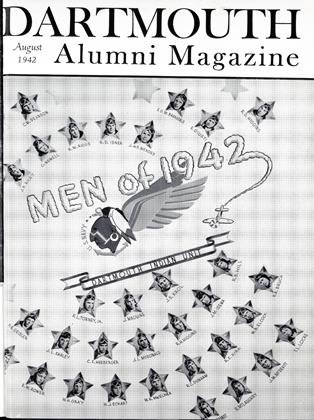Best Books To Date on New Subject of Geopolitics Are Reviewed and Recommended To Alumni
I AM GLAD that in spite of the war, and the need for economy so far as the DARTMOUTH ALUMNI MAGAZINE goes, I am going to write more columns concerning books I have enjoyed and that I believe you will find worthwhile, too.
At my Twentieth Reunion Frank Horan was quite excited about a book which he had recently read and which later sent me. This is a solid and substantial book by Nicholas John Spykman and its title: America's Strategy in World Politics. The author, a Dutchman, is a Professor at Yale in International Relations.
The general thesis is that the United States will have to operate in a world of power politics after World War II under conditions not very dissimilar from those which prevailed before the war began. We should be guided by a political strategy which demands, because it is a necessity, the preservation of a balance of power in Europe and in Asia, "and by the consideration that territorial security and peaceful change are more likely to be achieved if the individual states in the different power zones (geopolitics) do not differ too widely in their relative strength." It is possible, he argues that we may conceivably hope that a strong Germany and Japan exists after the war is over. This is not a book to skip through but demands the constant attention, and almost study, of the reader. However, it is undoubtedly an important book and is worth all the time and effort you put into it.
A much easier book to read and understand on geopolitics is one which Cecil Goldbeck kindly sent me entitled Geopolitics: The Struggle for Space and Power, by Robert Strausz-Hup6. Here the author reveals the teachings of Sir Halford Mackinder, and of Major General Professor Doktor Karl Haushofer. We must be aware of geopolitics which is a strategy for war, a pseudo-scientific excuse for stealing on a world wide scale, and this book, though not brilliant in the writing, will give you the fundamentals, as it were, of a subject that will be as popular as Coueism was some years ago. Soon, I trust, there will be published a primer on the subject but until this occurs this book will do. Putnams is the publisher and the price is $2.75.
Henry J. Taylor, less than a year ago, flew from New York to England, Sweden, Finland, Germany, Switzerland, Spain and Portugal. The result is an exciting and eminently readable book Time Runs Out (Doubleday Doran, 1942). In general Mr. Taylor hopes that we wont make the mistakes we made after the last great war. He believes (1) that all of Germany is guilty, and (a) that time runs out. We must hit hard now everywhere. Only by fighting all over the world at the sametime will we beat and destroy this greatest force for evil in the history of mankind. Time runs out. God's Time is now. It is unquestionably a vivid account of an amazing trip. It is important, too, in that it sounds an alarm that should be sounded both here and in England, especially after the fall of Tobruk, for we now know that time is running out.
My author for the month is Howard Fast, author o£ two stirring and excellent novels which concern Washington. One just out, Unvanquished, and the other, published in 1939, Conceived in Liberty. Mr. Fast uses an economy of words, and reminds me, at least, of Stephen Crane at his best. His tales are bared to the bone, and his ability to make Washington, Nathan Hale, Hamilton, Knox, Howe, and others seem real and human is amazing. The spirit which was Washington's is a spirit and a tradition which I believe is still ours, and the story- of Valley Forge in Conceived in Liberty, is not very remote from the story of Bataan and Corregidor. At least I believe it and hope that it is true. His third book I recommend without reservation is The Last Frontier, a story of a famous Indian trek during the Nine- teenth century. I am collecting Fast's first editions and I believe in his talent very much indeed.
You will enjoy, I think, Esther Forbes' magnificent recreation of Boston in her Paul Revere & The World He Lived In, Houghton Mifflin, 1942.
From the Argus Bookshop in Chicago you can get a reprint of Norman Davey's The Pilgrim of a Smile published first in 1921. This series of enigmatic tales have depth and brilliance and the fact that it is still a favorite of so many is partial proof of its charm. Highly recommended.
Ilka Chase's Past Imperfect (Doubleday, 1942) is an honest and amusing autobiography. There is a freshness in her views and in her language which is faintly exhilarating.
 View Full Issue
View Full Issue
More From This Issue
HERBERT F. WEST '22
-
 Article
ArticleHANOVER BROWSING
January 1935 By Herbert F. West '22 -
 Article
ArticleHanover Browsing
October 1938 By HERBERT F. WEST '22 -
 Article
ArticleHanover Browsing
December 1939 By HERBERT F. WEST '22 -
 Article
ArticleTAXI? CALL JOHN CASSIN '94
May 1940 By Herbert F. West '22 -
 Books
BooksDON'T COME CRYING TO ME.
February 1955 By HERBERT F. WEST '22 -
 Article
ArticleHanover Browsing
June 1956 By HERBERT F. WEST '22
Article
-
 Article
ArticleWINTER CARNIVAL EXPENSES
-
 Article
ArticleWith the Big Green Teams
APRIL 1969 -
 Article
ArticleOTHER LECTURES
April 1931 By Craing Thorn, Jr. -
 Article
ArticleYou Are Here
MAY 2000 By Noel Perrin -
 Article
ArticleThe Undergraduate Chair
April 1949 By Robert L. Allcott '50 -
 Article
ArticleMedical School
December 1954 By ROLF C. SYVERTSEN '18








